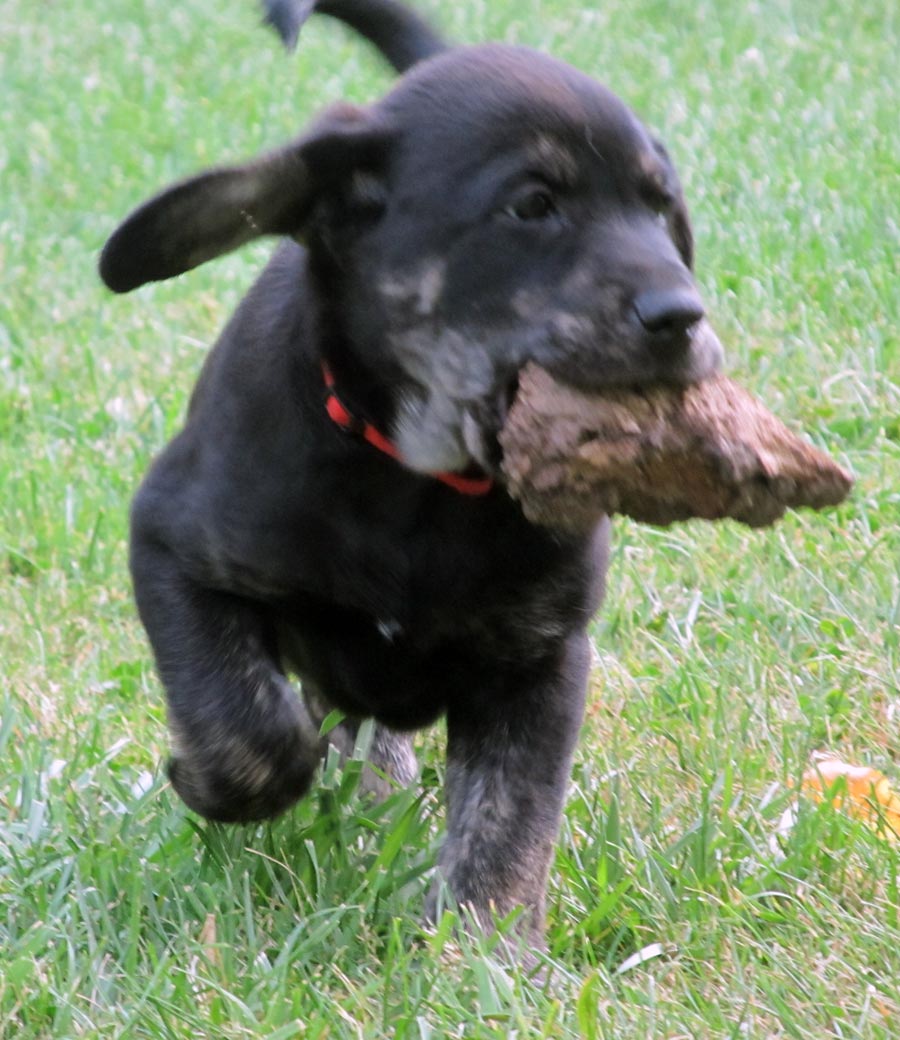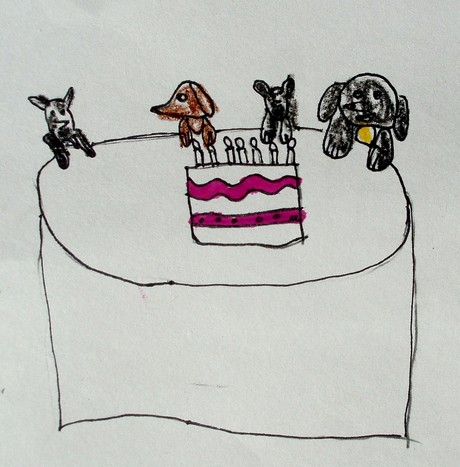Let me have dogs about me that are fat

McCracken was the fattest pup in his litter, and the only one with jowls
It's almost Christmas. I know this because of the festive seasonal lights, the gaudy store displays, and the sinking feeling in the pit of my stomach. Also because the media tips about dieting are already trickling in, preparing us for the tsunami of weight loss advice that will hit in January.
Last week, for instance, Metro Morning's house doctor discussed the dangers of yoyo dieting, while simultaneously sharing an enormous plate of homemade holiday cookies with the show's hosts. When queried about this paradox, he replied that he "likes to share the love."
Sharing the love is one reason we sometimes overfeed our pets, and not surprisingly, the same agitation about overeating, obesity, and staying healthy preoccupies pet experts. My dogs, while not yoyo dieters, have had a variety of experiences in the weight department. They've been both fat and thin, and feedback from the peanut gallery has demonstrated that people are less diplomatic about dogs than humans. I hope.
When my first dog Mim was very young puppy, for example, a guy looked at her and said "Whoa! That puppy's a fat little chunkster." We were at my then workplace, a university women's centre. Such cavalier commentary about bodies was one reason we frowned on men at the Centre.
"She's perfect. She's a puppy. That's how puppies look!" I said. The student flinched, not expecting my fierceness — another mistake made by men at the Centre. My defensiveness made me wonder if I was projecting my own body issues onto Mim. Everyone was a bit embarassed. Except Mim. She was looking around for something to eat.
Mim grew into a slender adult, as did the dogs who subsequently joined the household. Sometimes I felt uncomfortable about the small quantity of kibble that filled their bowls — less than half way. I reminded myself that kibble was nutrient- and calorie-dense, like power bars for humans. I eventually switched the dogs to real food, and was delighted to discover that their meals now took them longer than 7 seconds to inhale.
But when Mim was nine, she plopped herself in the lap of a friend who said thoughtfully, "Mim's getting a bit broad in the beam. There's some middle-aged spread happening." I vehemently denied it. (My rule is to reject criticism when it's delivered, and acknowledge it and perhaps apologize later). A visit to the vet confirmed my friend was right: Mim had gained ten pounds. Her thyroid gland was under-active.
I was surprised that I hadn't noticed her weight gain. I always noticed when I had to move my belt buckle a notch. It occurred to me that I might see my dogs' bodies even less objectively than I saw my own.
And now, thanks to media reports, I know I am not alone. More than fifty percent of our pets could be called fat little chunksters, and most of us don't realize it. Don't worry, though, we're about to be hyped out of our obliviousness.
Veterinarians, humane societies and the pet food industry are all sounding the alarm: At least half of our pets are fat. Possibly because many North American humans are fat. We're engaging in slow, symbiotic death by Doritos and Milk Bones.
I wonder what French dogs eat.

It's the holidays. Let them eat cake, already. Drawing by my nephew, Oscar.
Frightening people (with facts) has failed to motivate human weight loss, but the panic button is being pressed for our pets anyway: You are shaving up to two and half years off your pet's life! Osteoarthritis! Type 2 diabetes! High blood pressure! Heart, respiratory and kidney diseases! Many forms of cancer! Cruciate ligament tears!
Many vets are now offering nutritional counselling services. Presumably they're counselling humans, since dogs can't pry open refrigerator doors by themselves. In the US, dog boot camps ("Bark 'n' Burn") and doga classes are gaining popularity.
Many dollars are spent on high fibre, low fat junk. Let me save you some money: put less food in the dog bowl. Or feed once a day instead of twice. Observe what happens.
Many of the dogs I walk are a bit overweight, just on the border of no-waistline-land. I used to fret about it. Then Hillary and Foo, two of my own dogs, got very ill and very thin, and I wished they'd had extra padding as a safeguard. I have since seen other dogs mysteriously waste away, and can report that such illnesses are amongst the very hardest to live with, and to die from.
I also learned that, while chubby dogs evoke knowing smiles and unsolicited diet advice, thin dogs scare people. More than once people suggested I "put the dogs out of their misery." I still growl when I think about it.
There's been a lot of academic study done about weight and health, which may or may not apply to dogs. Some media reports state that taking in less than the recommended daily calories promotes longevity; other reports demonstrate that overweight (but not obese) humans live longer than those of "normal" body weight. Stay tuned for more inconsistent information and weird diet trends, for people and pets.
In the meantime, I am traumatized more by the uncertainties of skinniness than the perils of pudginess. I picked McCracken in part because he was the fattest puppy in the litter, the only one with jowls. He's a little on the lanky side now. If, in the future, his waistline blurs a bit, I will get his thyroid checked. But we're not going to Bark 'n' Burn.
And all my dogs get lots of Christmas treats. I'm sharing the love.